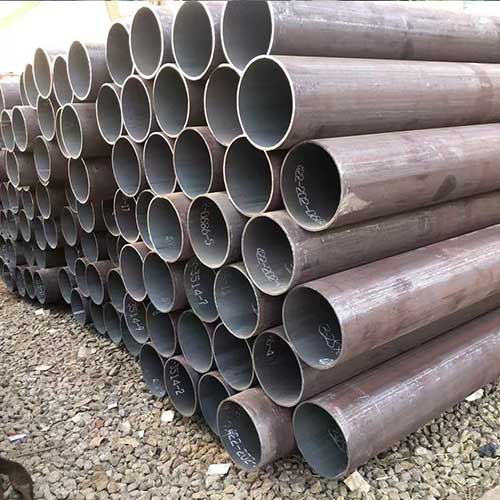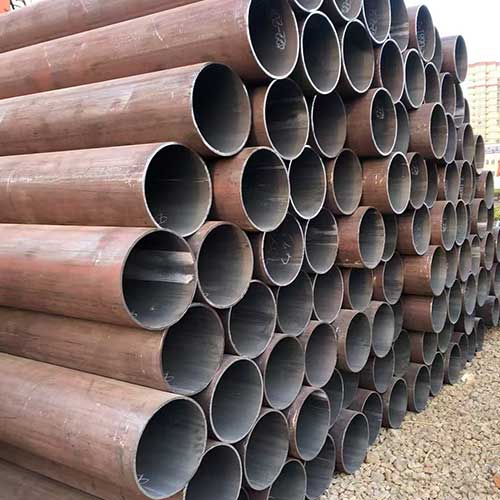مرحبًا بك في مدونتي!
قبل أن نتعمق في المحتوى، أود أن تنضموا إليّ على منصات التواصل الاجتماعي الخاصة بي حيث أشارك المزيد من الأفكار وأتفاعل مع المجتمع وأنشر التحديثات. إليك كيف يمكنك التواصل معي:
فيسبوك : فيسبوكhttps://www.facebook.com/profile.php?id=61565500692293
والآن، لنبدأ رحلتنا معًا. آمل أن تجدوا المحتوى هنا ثاقباً وجذاباً وقيّماً.
جدول المحتويات
مقدمة
Carbon steel pipes are fundamental components in many industries due to their remarkable strength, durability, and versatility. From high-pressure oil and gas pipelines to structural frameworks in construction, carbon steel pipes deliver reliable performance under demanding conditions. For engineers, project managers, and procurement professionals, selecting the right carbon steel pipe is a decision that impacts both operational efficiency and long-term maintenance costs.
In this article, we provide an in-depth exploration of carbon steel pipes, including their types, advantages, industrial applications, corrosion prevention strategies, installation considerations, and maintenance tips. By the end of this article, you’ll understand why Liaocheng Steel Pipe is a trusted provider of high-quality carbon steel pipe solutions for global industries.

Advantages of Carbon Steel Pipe in Industrial Applications
Carbon steel pipes have several advantages that make them a preferred choice across a wide array of sectors:
- High Mechanical Strength: Carbon steel has a high tensile strength, enabling it to withstand internal pressures and heavy loads without deformation.
- Durability Under Extreme Conditions: These pipes perform well under high temperatures and pressures, making them suitable for demanding environments like oil and gas pipelines.
- Cost-Effectiveness: Compared to stainless steel or alloy pipes, carbon steel provides similar structural benefits at a fraction of the cost.
- تعدد الاستخدامات: Carbon steel pipes are available in multiple grades, diameters, and wall thicknesses, allowing customization for specific projects.
- سهولة التصنيع: Carbon steel can be welded, cut, and machined efficiently, making it ideal for complex installations.
These advantages make carbon steel pipes essential for industries such as oil and gas, power generation, construction, water supply systems, and chemical processing. According to data from industry-standard reports, carbon steel piping accounts for over 60% of global industrial pipeline installations due to these properties.
أنواع أنابيب الصلب الكربوني
Understanding the different types of carbon steel pipe is crucial for selecting the right material for your project. Carbon steel pipes are generally categorized by their carbon content:
| Pipe Type | محتوى الكربون | التطبيقات الشائعة | Maximum Pressure Rating |
|---|---|---|---|
| فولاذ منخفض الكربون | 0.05–0.25% | Water pipelines, low-pressure industrial systems, structural scaffolding | 15–25 MPa |
| الفولاذ الكربوني المتوسط | 0.25–0.60% | Oil & gas pipelines, high-pressure fluid transport, machinery components | 25–35 MPa |
| فولاذ عالي الكربون | 0.60–1.0% | Heavy-duty machinery, structural frameworks, wear-resistant systems | 35–50 MPa |
Data reference: Material specifications based on industrial carbon steel pipe standards (ASTM A106, ASTM A53).

Carbon Steel Pipe vs Stainless Steel Pipe
When choosing between carbon steel and stainless steel, several factors should be considered:
- مقاومة التآكل: Stainless steel has superior resistance to corrosion, but carbon steel can achieve comparable longevity with proper coatings.
- Strength and Pressure Handling: Carbon steel provides higher tensile strength at lower cost, which is crucial for pipelines subjected to high pressures.
- Cost Consideration: Carbon steel is significantly more cost-effective than stainless steel, making it ideal for large-scale installations.
- Maintenance Requirements: Carbon steel requires proactive maintenance to prevent rust, whereas stainless steel requires minimal upkeep.
By applying protective measures such as galvanization or painting, carbon steel pipes can perform reliably in environments that would otherwise favor stainless steel, offering both durability and cost efficiency.
Corrosion Prevention and Maintenance
Corrosion is one of the main challenges for carbon steel pipes, especially when transporting water, chemicals, or exposed to atmospheric moisture. Effective prevention strategies include:
| Maintenance Action | Recommended Frequency | المزايا |
|---|---|---|
| Coating inspection | Every 6 months | Prevent corrosion and prolong pipe life |
| Pressure testing | Annually | Ensure structural integrity under operational load |
| Cleaning & flushing | Quarterly | Remove deposits and prevent rust accumulation |
| Cathodic protection | Continuous | Protect underground or submerged pipes from electrochemical corrosion |
Regular inspection, combined with protective coatings, helps maintain the integrity of carbon steel pipes, ensuring optimal performance for decades. Liaocheng Steel Pipe provides detailed maintenance guidelines with every purchase, allowing clients to maximize pipe lifespan.
Carbon Steel Pipe in Oil & Gas Industry
In oil and gas applications, carbon steel pipes are widely used for drilling, transportation, and refining due to their ability to handle extreme pressure and temperature conditions. Typical specifications include API 5L grade pipes for pipeline transport, capable of withstanding high internal pressures without deformation.
| التطبيق | نطاق الضغط | نطاق درجة الحرارة | Notes |
|---|---|---|---|
| Crude oil transport | Up to 35 MPa | -20°C to 150°C | Requires protective internal coating |
| Gas pipelines | Up to 30 MPa | -10°C to 120°C | Cathodic protection recommended |
| Drilling casing | Up to 40 MPa | Varies with formation | Liaocheng Steel Pipe provides custom-grade casing |
Data reference: Industry pipeline standards and API 5L specifications.

Carbon Steel Pipe in Construction and Manufacturing
Beyond pipelines, carbon steel pipes play a vital role in construction and manufacturing:
- Structural Frameworks: They provide strength and stability for buildings, bridges, and scaffolding systems.
- Mechanical Components: Carbon steel pipes are used for machinery parts due to their strength and wear resistance.
- HVAC Systems: Used in ventilation and water distribution pipelines.
- Industrial Fabrication: Carbon steel pipes can be customized for pressure vessels, storage tanks, and conveyor systems.
By offering a variety of pipe sizes and customizations, Liaocheng Steel Pipe ensures your projects achieve both safety and efficiency.
Installation Guidelines for Carbon Steel Pipes
Proper installation of carbon steel pipes ensures their longevity and performance. Key considerations include:
- Joint Integrity: Use high-quality welding or threaded connections to prevent leaks.
- Support and Alignment: Proper pipe supports reduce mechanical stress and prevent sagging.
- Coating Application: Apply anti-corrosion coatings before installation for maximum protection.
- Testing and Commissioning: Conduct pressure tests and inspections before operational use.
الخاتمة
Carbon steel pipes are versatile, strong, and cost-effective solutions for numerous industrial applications. With proper selection, installation, and maintenance, these pipes can last decades while maintaining performance under extreme conditions.
Liaocheng Steel Pipe delivers high-quality carbon steel pipes, professional guidance, and custom solutions to ensure your projects succeed with reliable, durable piping solutions.
الأسئلة الشائعة
What industries use carbon steel pipes?
Common industries include oil and gas, construction, power generation, chemical processing, and machinery manufacturing.
How do carbon steel pipes compare to stainless steel pipes?
Carbon steel pipes offer higher strength and lower cost, but require protective coatings to prevent corrosion, unlike stainless steel.
Can carbon steel pipes be coated for corrosion protection?
Yes, methods such as galvanization, painting, and cathodic protection significantly extend their lifespan.
What sizes and grades are available?
Liaocheng Steel Pipe offers a wide range of diameters, wall thicknesses, and grades (low, medium, and high carbon) to suit any project.
How do I ensure the quality of carbon steel pipes?
Verify certifications, pressure test reports, and material compliance from trusted suppliers such as Liaocheng Steel Pipe.

